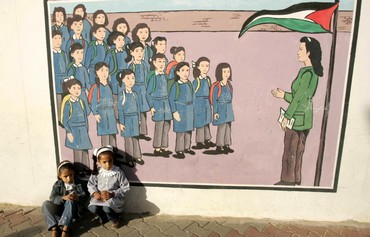SPEAKERS:
Bassem Eid
Director, Palestinian Human Rights Monitoring Group
Dr. Arnon Groiss
Deputy Director, IBA’s Arabic Radio
Translator of Arabic Schoolbooks
David Bedein, MSW
Director, Center for Near East Policy Research
Founder, The Israel Resource News Agency
TIME: 12.30 – 2pm, Thursday 4th December 2014
VENUE: Thatcher Room, Portcullis House, House of Commons, London SW1A 2LW
To attend please RSVP to: researchassistant8@henryjacksonsociety.org
The United Nations Relief and Works Agency for Palestine Refugees in the Near East, better known as UNRWA, was designed to provide aid and services to Arab refugees and their descendants from the time of Israel’s founding. UNRWA declares itself to be “one of the largest United Nations programmes, with over 30,000 personnel working across five areas of operations”, including managing the education of 492,000 students and providing healthcare, relief and social services, camp infrastructure, microfinance and emergency assistance.
Several aspects of UNRWA’s activities have however proven controversial. Many of those familiar with the official Palestinian Authority textbooks used in UNRWA schools have noted the re-occurring theme of the “right of return” to what is now Israel being presented as the exclusive goal for which the Palestinian youth must live and die, whilst it could also be argued that UNRWA’s confinement of Palestinians to refugee camps under the “right of return” could constitute a violation of human rights.
In what is one of the most complex geopolitical situations of the 21st century, does UNRWA perpetuate the stateless status of the refugees and their descendants, reinforcing a life of limbo? Is there basis for the fears that Hamas has taken over UNRWA trade and teachers unions and has hijacked UNRWA facilities and resources in its war against Israel? And what role should be taken on by the donor nations, who through controlling the funding for the programme have the power to determine its policies?
By kind invitation of Louise Ellman MP, The Henry Jackson Society is pleased to invite you to a discussion with Bassem Eid, Director of the Palestinian Human Rights Monitoring Group; Dr. Arnon Groiss, Deputy Director of IBA’s Arabic Radio and experienced translator of Arabic schoolbooks; and David Bedein, Director of the Center for Near East Policy Research and Founder of The Israel Resource News Agency. The three speakers will bring their personal perspectives to the discussion and will call for auditing of the funds allocated to UNRWA, making sure that the UNRWA curriculum stops incorporating principles of martyrdom and “right to return” through use of arms, and dismissing those UNRWA officials who have clear and proven links to Hamas.
Biographies
Bassem Eid is director of the Jerusalem-based Palestinian Human Rights Monitoring Group. Born in Jerusalem, he spent the first 33 years of his life in the UNRWA Shuafat Refugee Camp in Jerusalem. He became a prominent figure during the first Intifada, the Palestinian uprising, as senior field researcher for B’Tselem, the Israeli Information Center for Human Rights in Judea, Samaria and Gaza.
He publicly condemned the widespread killing of Palestinian collaborators, often for reasons unrelated to the Intifada. In 1995, following his report about the Palestinian Preventative Security Service treatment of Palestinians, he came under attack by Palestinian Authority leadership for revealing human rights violations committed by the Palestinian Authority. He continued his criticisms of both Israeli and Palestinian security forces. Arrested by Palestinian Authority Force 17, Arafat’s Presidential Guard, he was released after 25 hours following widespread international condemnation.
In response to the deterioration in the human rights situation under the PA, he founded the Palestinian Human Rights Monitoring Group, which monitors abuses committed by the PA, and also deals to some extent with Israel. It is a non-partisan human rights organisation, dedicated to exposing human rights violations and supporting a democratic and pluralistic Palestine. Bassam Eid is a frequent critic of UNRWA, for keeping Palestinians in refugee camps under what he describes as the “false pretense of the right of return”.
Dr. Arnon Groiss served as director of research for the Institute for Monitoring Peace and Cultural Tolerance, www.impact-se.org, between the years 2000-2010, and authored its reports on hundreds of schoolbooks of Egypt, Syria, Saudi Arabia, Iran, Tunisia and the Palestinian Authority. Dr. Groiss’ career includes more than 35 years as an Arabic-language journalist and he presently holds the position of deputy director at IBA’s Arabic Radio Service. He holds an MA and PhD from Princeton University’s Department of Near Eastern Studies and an MPA from the Harvard University Kennedy School of Government, in addition to a BA degree from the Hebrew University departments of History of the Middle East and Arabic Language & Literature. Dr. Groiss has been retained by the Center for Near East Policy Research for the past four years to present his research on Palestinian UNRWA education to the nations that donate to UNRWA.
David Bedein serves as the director of the Center for Near East Policy Research. He is a community organiser by profession, a writer, and an investigative journalist. He established the Israel Resource News Agency in 1987 and became the head of the Center for Near East Policy Research in 2005. He has covered Middle East negotiations in Oslo, Ottawa, Shepherdstown, the Wye Plantation, Annapolis, Geneva, Nicosia, Washington, D.C., London, Bonn, and Vienna. Mr. Bedein’s latest book, published in May 2014, isROADBLOCK TO PEACE – How the UN Perpetuates the Arab-Israeli Conflict: UNRWA policies reconsidered. Mr. Bedein has also produced seven films about UNRWA as well as of numerous articles and investigative reports.
‘Perpetuating Statelessness? UNRWA, Its Activities and Funding’









